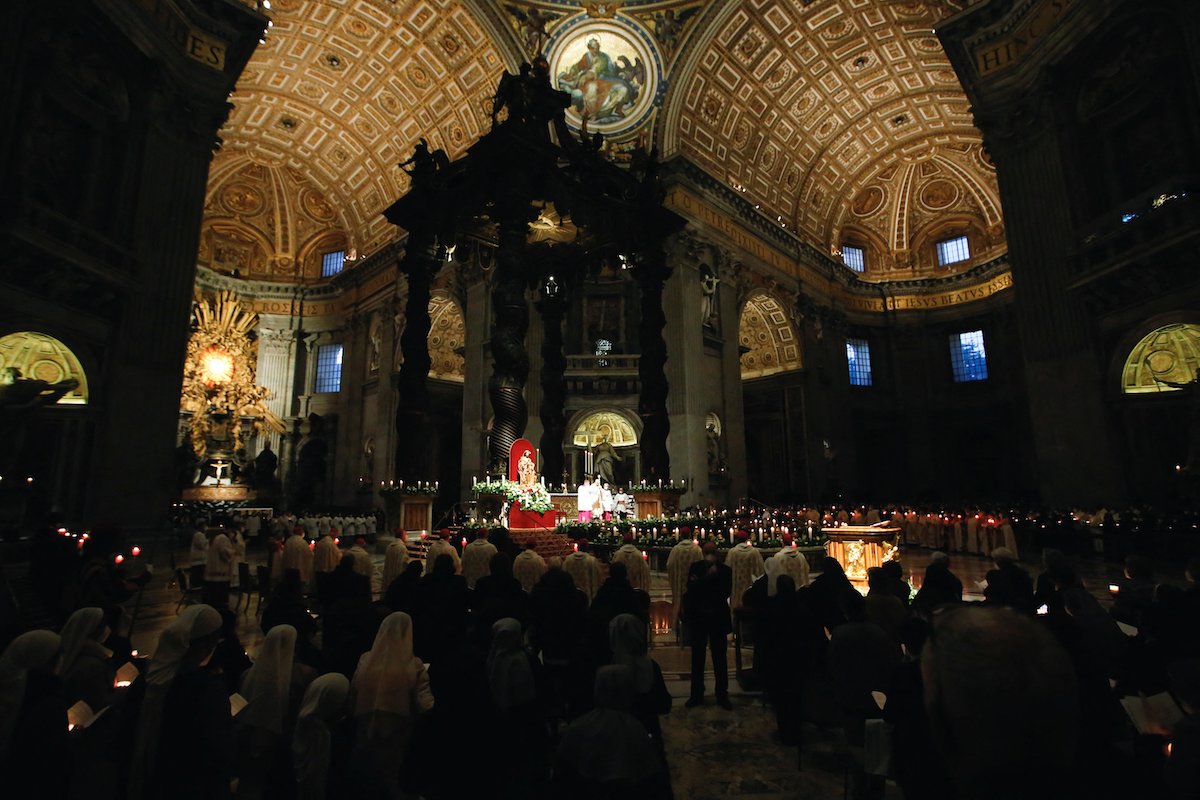By Junno Arocho Esteves, Catholic News Service
VATICAN CITY (CNS) — The Holy Spirit, and not the need for recognition, must be the primary motivation in one’s religious life, Pope Francis told consecrated men and women.
“Sometimes, even behind the appearance of good works, the canker of narcissism, or the need to stand out, can be concealed. In other cases, even as we go about doing many things, our religious communities can appear moved more by mechanical repetition — acting out of habit, just to keep busy — than by enthusiastic openness to the Holy Spirit,” the pope said in his homily Feb. 2.
“Let us today examine our interior motivations and discern our spiritual movements, so that the renewal of consecrated life may come about, first and foremost, from there,” he said.
Hundreds of men and women belonging to religious orders attended the Mass for the celebration of Candlemas — the feast of the Presentation of the Lord — which also marks the Vatican celebration of the World Day for Consecrated Life.
During the Mass, Pope Francis exchanged consecrated bread and wine with Armenian Catholic Patriarch Raphaël Pierre XXI Minassian, who was elected in September, thus sealing their ecclesial communion.
In September, after the election, the pope granted the Armenian patriarch’s request for unity, which is sealed with the gesture of partaking of the Eucharist together. The Armenian Patriarchate, based in Beirut, is one of 22 Eastern Catholic Churches that is in full unity with the Holy See and the Catholic Church.
The Mass began with the traditional blessing of candles. Led by several candle-bearing acolytes, Pope Francis processed toward the Altar of the Chair in a darkened St. Peter’s Basilica, faintly lit by the congregation’s candles as the choir sang, “O radiant light, eternal splendor of the father, Christ the Lord immortal.”
Pope Francis blessed the candles and prayed that the Lord would guide all men and women “on the path of good” toward his Son, “the light that has no end.”
In his homily, the pope reflected on the Gospel reading from St. Luke, in which the young Mary and Joseph, along with baby Jesus, meet the elderly Simeon and Anna, who “await in the Temple the fulfilment of the promise that God made to his people: the coming of the Messiah.”
Just like the elderly Simeon recognizes the Messiah “in the guise of a poor little baby,” religious men and women are called to be “moved by the Spirit” rather than success or prestige in their congregations.
“The spirit moves us to see God in the littleness and vulnerability of a baby, yet we at times risk seeing our consecration only in terms of results, goals and success: We look for influence, for visibility, for numbers,” the pope said. “The Spirit, on the other hand, asks for none of this. He wants us to cultivate daily fidelity and to be attentive to the little things entrusted to our care.”
Secondly, Simeon’s example of seeing and recognizing Christ is a testament to the “great miracle of faith” that “opens eyes, transforms gazes and changes perspectives.”
While the world often sees consecrated life as “a waste, a relic of the past, something useless,” the pope called on religious men and women to reflect on how they view religious life and whether their eyes are “turned only inward, yearning for something that no longer exists, or are we capable of a farsighted gaze of faith, one that looks both within and beyond.”
“Let us open our eyes: The spirit is inviting us amid our crises, decreasing numbers and diminishing forces, to renew our lives and our communities. Let us look at Simeon and Anna: Although they were advanced in years, they did not spend their days mourning a past that never comes back, but instead embraced the future opening up before them,” he said.
Pope Francis said the act of Simeon taking baby Jesus in his arms reflects the calling to embrace Jesus in one’s life, which is “the very heart of faith” and an important aspect of Christian life, especially at times when “losing our bearings, getting caught up in a thousand different things, obsessing about minor issues or plunging into new projects.”
“If consecrated men and women lack words that bless God and other people, if they lack joy, if their enthusiasm fails, if their fraternal life is only a chore, it is not the fault of someone or something else,” the pope said. “It is because our arms no longer embrace Jesus. When that happens, our hearts fall prey to bitterness, to complaining about things that do not go like clockwork, to rigidity and inflexibility, to the illusion of our own superiority.”
Instead, when one embraces Christ, he or she will also “embrace others with trust and humility.”
“Then conflicts will not escalate, disagreements will not divide, and the temptation to domineer and to offend the dignity of others will be overcome,” he said.






